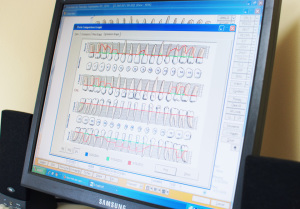
Periodontal Dentistry
Periodontal Disease
The mouth is a window to health for the body and is an indicator of systemic or whole body health. It can show if you are not eating healthy, or if you are at risk for diseases. One of these diseases is called periodontal disease, gum disease or periodontitis, and it affects half of all adults age 30 and older. Despite its prevalence, periodontal disease is rarely discussed, resulting in a lack of urgency for people to properly care for their gums. Simple steps like brushing twice a day, flossing daily, and receiving a comprehensive periodontal evaluation from Dr. Cook and his team can help detect and prevent gum disease.
Mouth and Body Connection
Periodontal disease is an inflammatory condition that can lead to receding gums, jaw bone damage, mobile teeth, bleeding gums, and ultimately loss of teeth. It can also increase the risk of other systemic health problems and chronic diseases, including cardiovascular disease, diabetes, rheumatoid arthritis, Alzheimer’s disease, and even cancer. Gum disease can affect children, women and men. We feel that this link between mouth and body is important, and we teach home care techniques for your mouth that encourage full body health.
Your Periodontal Evaluation
At every visit our dental hygienists and Dr. Cook assess your gum health. Part of this assessment is done through a process called “probing.” During probing, we take six readings on each tooth to evaluate your pocket depth (the space between teeth and gums). We also record your gum recession. Probe depth and recession are both key indicators of gum health or disease. We keep a record of probe depth and recession on your patient chart in order to refer back to it. We will also evaluate your radiographs for bone loss. We provide you with a Periodontal Diagnosis and Progress Report that will help you improve the health of your tissues. With good home care habits and regular visits with Dr. Cook and his team, your tissues can be stabilized and healthy.
Scaling and Root Planing
Often we recommend a procedure called “scaling and root planing” that will be necessary in order for your mouth to be healthy. Over time, plaque and calculus can spread and grow below the gum line. A dental hygienist at Dr. Cook’s office can perform the scaling and root planing procedure that cleans out these deep pockets so your gum tissue can heal.
Arestin® Placement
We may also recommend a site-specific antibiotic treatment to help stabilize your gum disease. Arestin is an antibiotic that can be inserted by Dr. Cook or a dental hygienist into your gum pockets. The goal of this antibiotic is to kill the bacteria that causes gum disease.


